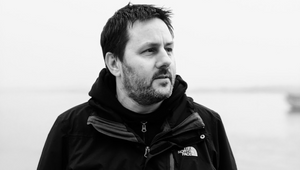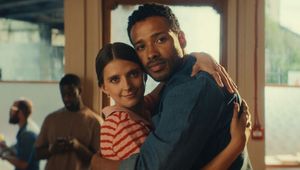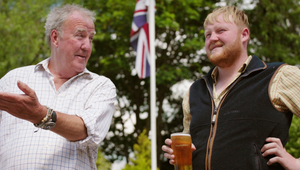
Thinking in Sound: Trusting Your Ears with Ellis McGourlay

Ellis McGourlay has over a decade of industry experience, having progressed through the ranks at 750mph from runner to sound designer. In that time, he has been recognised for numerous industry awards, including a British Arrow win for his work on UN Body Right. More recently, Ellis has been nominated the Music and Sound Awards, in recognition of his excellent work on the short film ‘I Love You, I Hate You’.
Ellis has a reputation for outstanding work across all areas of audio production, however, he has a passion for crafting dynamic, vibrant sound design for sports adverts.
LBB> When you’re working on a new brief or project, what’s your typical starting point? How do you break it down and how do you like to generate your ideas or response?
Ellis> The first thing I like to do when starting a new project is to have a conversation with the creatives/director, and try to fully understand their vision. I think I’m lucky, in that ideas for sounds come pretty easily to me once I’m presented with an edit. So, it’s more a case of getting them down and distilling them, until they work the way I want them to.
I’ll typically watch an edit a few times, make some notes and begin to construct the key pieces of sound design from there. If a project is music or VO lead, then I would prefer to get a music or VO edit to build around. I think it’s important to decide early on which elements are the anchor within your mix.
LBB> Music and sound are in some ways the most collaborative and interactive forms of creativity - what are your thoughts on this? Do you prefer to work solo or with a gang - and what are some of your most memorable professional collaborations?
Ellis> I’m very used to collaborating with other sound designers on bigger projects, and some of my best work has been the result of working as a team. For example, I have previously done a couple of jobs where I worked with Sam Ashwell and Mike Bovill: Era of Conquest and Riyadh Everything or Nothing, and they are probably amongst my best collabs.
I think in making any kind of film, you are always going to be collaborating to help other creatives achieve their vision with your sound. So, whether you are working on your own in the studio, or with a bunch of clients in there, you’re always collaborating really. If I have a longer edit, or more complex piece of sound design, then I like to try and make sure I have a bit of time on my own to try out ideas after the initial brief. Sometimes it’s nice to be able to let your ideas take shape before you have to present them.
LBB> What’s the most satisfying part of your job and why?
Ellis> We used to have a joke when I worked in the Transfer Bay years ago. When we saw the first proper offline of an advert that we had done the animatic for, that was ‘the best part of the job’. It’s so nice when you have been working on a project from its infancy to see it take its final form. I also love seeing my work in a TV ad break (probably because I don’t often watch TV that has ads), I’m hoping the novelty never wears off.
LBB> As the advertising industry changes, how do you think the role of music and sound is changing with it?
Ellis> Great music and pristine sound will always be something that brands will want to associate themselves with. Ads that are sonically memorable have a lifespan that far exceeds their visual siblings. I can still quote adverts from my childhood, think “Budweiser – Wassup” or “Jaffa Cake - Full Moon Half Moon”. Those soundbites are just embedded into my brain.
What has changed is the medium through which the listener hears the music and sound. Most of the time, we are mixing for iPhones, laptops and earbuds, so that brings its own challenges. Social media has been the big change during my time in advertising, when I started it was a lot more TV, radio and cinema, but social/online has taken a huge chunk of that, so the way we use music and sound has had to adapt.
LBB> Who are your musical or audio heroes and why?
Ellis> That’s a tough one! Musically I’ve loved lots of different artists at different stages of my life. I love Four Tet’s philosophy around creating music, there’s a great episode of Tape Note’s podcast if you’re interested. I love how he discards any pretence and overcomplication. Strangely though, he’s probably not an artist that I listen to a great deal.
Sound design wise, the last film that I watched that really impressed me was ‘Rango’. I was at an AirBnB and they had the Blu-Ray of it lying around, so I gave it a watch. Even on a small TV I was really impressed by the level of detail the sound designer, Peter Miller, achieved.
LBB> And when it comes to your particular field, whether sound design or composing, are there any particular ideas or pioneers that you go back to frequently or who really influence your thinking about the work you do?
Ellis> Realistically, the people who have had the biggest influence on the way I work and the way I think about my work are all the other sound designers that I’ve learned from over the last decade. I’ve been lucky enough to be able to call upon the experience of some of the best engineers in the industry, and now at Absolute I have two of the best in Rich and Arge. I think trusting your ears is the number one rule, aside from that all other rules can be broken.
LBB> When you’re working on something that isn’t directly sound design or music (let's say going through client briefs or answering emails) - are you the sort of person who needs music and noise in the background or is that completely distracting to you? What are your thoughts on ‘background’ sound and music as you work?
Ellis> I think it depends on the intensity of what I’m doing, if I’m reading a brief then definitely no music- I’m letting my mind zero in on the story. Sound studios are extremely quiet when there’s nothing coming out of the speakers, so they can actually be a great place to focus.
If I’m just casually replying to a few emails, I’ve almost definitely got some music on! I think it would be a crime to not blast out tunes given the quality of the speakers that I have on Mortimer Street, every studio here sounds like an absolute dream (no pun intended).
LBB> I guess the quality of the listening experience and the context that audiences listen to music/sound in has changed over the years. There’s the switch from analogue to digital and now we seem to be divided between bad-ass surround-sound immersive experiences and on-the-go, low quality sound (often the audio is competing with a million other distractions) - how does that factor into how you approach your work?
Ellis> I kind of touched on this earlier, but I definitely consider the playback medium when creating a mix. I think headphone technology has come a long way, and you can get a pretty decent pair of consumer earbuds for between 50 and 100 quid. I think with regards to poor playback systems, you must ensure that key elements like the VO, dialogue and storytelling bits of sound design come through well. However, it’s not realistic to expect intricate detail to be heard on a tiny phone speaker or some very cheap earbuds.
Great audio playback systems are out there and more accessible than ever to those who want to find them. I think we can achieve so much more with sound design when compared to 20 years ago, and a lot of that is down to improvements in both studio equipment and consumer playback systems.
LBB> On a typical day, what does your ‘listening diet’ look like?
Ellis> If I’m taking the train into town, I usually start the day with a podcast. I like a couple of football podcasts “Undr the Cosh” and “No Tippy Tappy Football”, or maybe the “Tape Notes” podcast if I’m wanting to get inspired musically. I’m pretty consistent with going through my Discover Weekly on a Monday, as there’s normally a couple of gems in there. Say what you want about Spotify, but I do like some of their algorithms.
I think it would be disingenuous to tell you what music I listen to if it wasn’t backed by hard data, so here are the first five tracks from my 2023 wrapped playlist...
Boards of Canada – Chromakey Dreamcoat
The Smashing Pumpkins - Mayonaise
LBB> Do you have a collection of music/sounds and what shape does it take (are you a vinyl nerd, do you have hard drives full of random bird sounds, are you a hyper-organised spotify-er…)?
Ellis> I use Spotify and I have a big playlist with about two thousand songs on it, not very organized at all. I bought a DJ controller last year, so I do want to organize my big mess of a library into some smaller, more curated playlists that I can turn into DJ sets eventually.
LBB> Outside of the music and sound world, what sort of art or topics really excite you and do you ever relate that back to music?
Ellis> I get really inspired by walking around and just trying to be present, taking in the sounds of the city, or if I’m out of London, the sounds of wherever I’ve ended up in the world!
LBB> Let’s talk travel! It’s often cited as one of the most creatively inspiring things you can do - I’d love to know what are the most exciting or inspiring experiences you’ve had when it comes to sound and music on your travels?
Ellis> I was in Hanoi in March this year, and boy is that a noisy place! But I wouldn’t say I necessarily get inspired by two-stroke engines and horns. I think I’m honestly more inspired by the sound of London. If you take a walk from Fitzrovia to Charing Cross, the mix of sounds created by the city is rich and ever-changing. I was in Morocco a few weeks ago, and I loved the sounds of the crickets and cicadas on an evening, you don’t get that in Zone 1...
LBB> As we age, our ears change physically and our tastes evolve too, and life changes mean we don’t get to engage in our passions in the same intensity as in our youth - how has your relationship with sound and music changed over the years?
Ellis> I remember as a transfer engineer walking into a studio where a very high-pitched sine wave was ringing out at a decent volume and the two older engineers in there had absolutely no idea! So yes, we definitely do lose the high end of our hearing as we age.
I picked up a guitar aged nine, and since then, music and sound has been my life. I don’t think that will ever change. Where I decided to devote my attention has changed over time; I don’t really play guitar much anymore, but I still create electronic music for fun and obviously my work is sound! Rich (head of sound at Absolute) has a few guitars lying about in the studio, so who knows, maybe I’ll pick it back up again now I’ve started here. They do look quite tempting...
With regards to the music I listen to, I think that if I’ve really loved it at one point in my life, then some part of me loves it forever. There’s definitely something in our brains that means that songs you loved when you were fifteen will always sound great. My music consumption goes in waves, but I can’t imagine living a life where I don’t listen to music.















